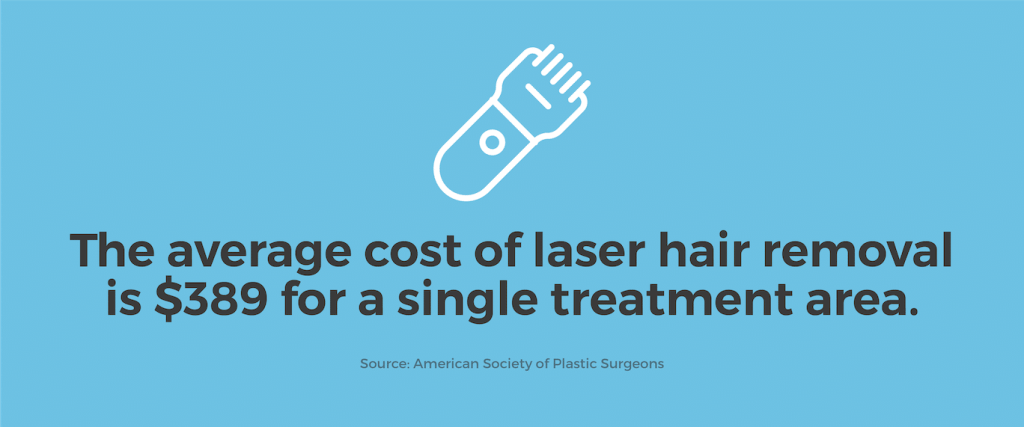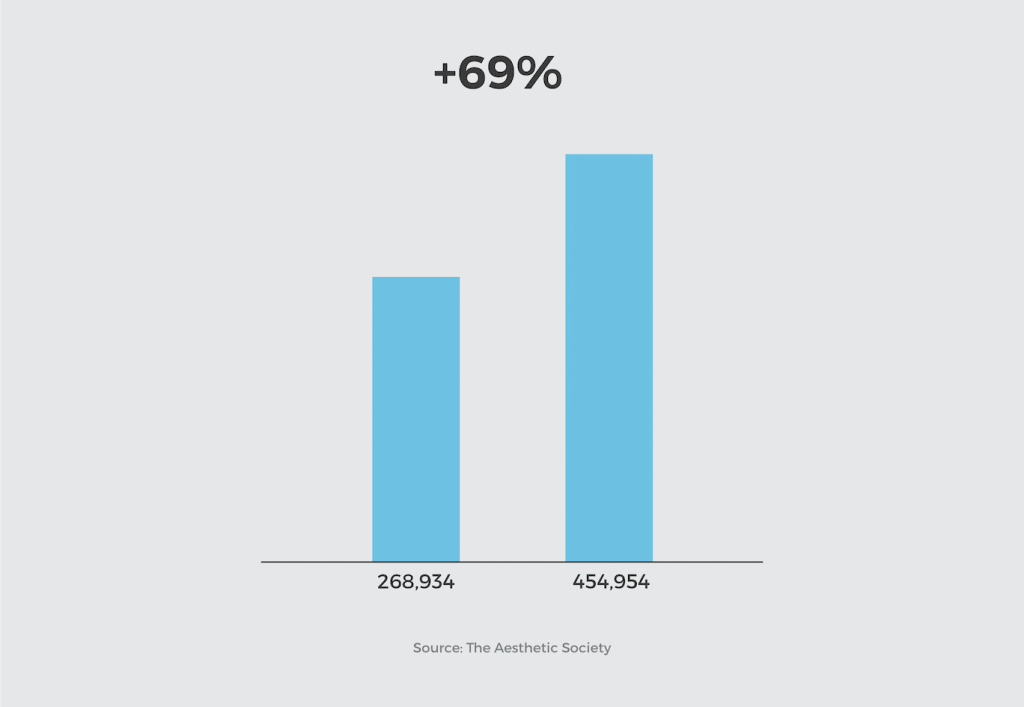
Does Insurance Cover Laser Hair Removal?
One of the most common questions patients ask during their consultation is, “Does insurance cover laser hair removal?” And rightfully so, laser hair removal can be a big financial investment.
As with any treatment, it’s important to understand all aspects of laser hair removal–including the cost and any potential insurance coverage you might have available–before you make a decision. We’re eager to answer questions about cost, insurance coverage, and payment plans to help you make a decision that’s right for you.
Let’s explore whether insurance covers the cost of laser hair removal, which medical conditions might make you eligible for coverage, the average cost of laser hair removal, and more. Keep reading or use the links below.
Typically, Does Insurance Cover Laser Hair Removal?
Generally speaking, insurance doesn’t cover the cost of laser hair removal.
Laser hair removal and other similar procedures are generally considered cosmetic and are not deemed medically necessary by insurance providers. As a result, patients typically pay for laser hair removal out of pocket, even when they have excessive hair growth, have to shave or wax more often than others, or feel that their hair growth interrupts their quality of life.
However, all insurance plans and providers are different, so that might not always be the case. Sometimes laser hair removal is covered. The only way to know for sure whether you’ll get any assistance from your insurance company is to review your policy and speak with the provider directly.
If you have a medical condition directly contributing to excessive facial or body hair growth, it may be worthwhile to contact your insurance company directly just to see.
Does Insurance Cover Laser Hair Removal for Medical Reasons?
Although it’s not common, insurance might cover part of all of the cost of laser hair removal in some cases. If you have a medical condition that directly causes excessive facial or body hair growth, you may find that your insurance company will cover or reimburse you for part or all of your treatment.
Even with a qualifying medical condition, your plan might require evidence that you have failed other treatments or that your condition interferes with your daily life.
Unfortunately, in some cases, when insurance policies include some coverage for laser hair removal, claims are sometimes denied. Many carriers have narrow guidelines outlining when services are covered. That said, you’ll never know unless you ask.
3 Conditions Laser Hair Removal May Be Covered For
Does health insurance cover laser hair removal in any cases? Insurance coverage for laser hair removal might be available for patients with certain medical conditions, depending on your insurance carrier, the specific plan, and where you live.
Some conditions that are occasionally covered when they have a significant impact on the patient’s life include:
- Hirsutism: A condition characterized by excessive hair growth on the face, back, chest, and abdomen in women. It’s most often caused by hormonal imbalances like polycystic ovary syndrome or PCOS. If other treatments are not effective, an insurance carrier might cover the cost of laser hair removal when medically necessary.
- Pseudofolliculitis barbae: A condition characterized by recurrent ingrown hairs caused by shaving. Those prone to ingrown hairs may be at higher risk of infection and additional complications, making laser hair removal the safest option. Although rare, insurance might cover part or all of the cost of laser hair removal for certain patients who experience recurrent ingrown hairs.
- Hypertrichosis: This is an excessive hair growth condition that isn’t aligned with typical growth patterns–meaning you experience hair growing where it typically shouldn’t. While other treatments are generally tried first, laser hair removal may be approved by insurance if they’re unsuccessful.
It’s important to note that even with these conditions, laser hair removal is not covered by health insurance carriers in many instances. It’s best to approach laser hair removal under the assumption that your costs will come out of pocket and then explore all avenues of coverage to be sure.
The prospect of getting laser hair removal should be an exciting one, but that can be dampened by the frustration that comes with an unexpected denial.
What Is the Average Cost of Laser Hair Removal?
The average cost of laser hair removal is approximately $389, but costs may be more or less depending on each patient’s unique circumstances. Factors that may influence the cost of your laser hair removal treatment include:
- How many areas you’re having treated. The more treatment areas you’re having laser hair removal done on, usually, the more you’ll invest in the procedure. The cost of full-body laser hair removal is going to be much more expensive than just having two isolated areas done.
- The size of the treatment area. Typically, the larger the treatment area, the higher the initial investment. For example, the cost of Brazilian laser hair removal is typically less than back laser hair removal.
- Number of sessions required. Most services are priced per session, so additional sessions will increase the overall cost of treatment.
- How much hair you have and how coarse it is. Generally, thicker, coarser hair requires more aggressive treatment, which can drive up costs.
Where you live, what kind of practice, and your provider’s experience level can also influence the cost of laser hair removal. Researching several different providers in your area and comparing their qualifications and estimates can help you make an informed decision about your treatment.
How to Save If Your Laser Hair Removal Isn’t Covered
There are several ways to save money on laser hair removal if you plan ahead.
First, reach out to local providers to ask if they offer specials, how often they offer them, and when their next special will be. While they may have policies that prevent them from sharing future specials, you can call back to check in once you know a particular medical spa or clinic does offer occasional discounts.
You’ll also want to ask about payment options. Some practices offer no- or low-interest payment plans. Others accept credit plans that allow you to use them toward cosmetic treatments. These plans allow you to borrow money at the time of service and then pay it back to the lender over a period of several months.
Finally, you should compare the cost of laser hair removal to the cost of ongoing waxing. Most patients discover that laser hair removal is actually more affordable than frequent waxing in a salon setting.
That’s because while laser hair removal requires an up-front investment, it stops or slows regrowth, so maintenance appointments are only required on occasion, compared to waxing every three to six weeks (and sometimes more often for those with medical conditions that lead to excessive hair growth). Knowing that the initial investment could provide long-term savings might make it easier to find room in your budget.
Are There Alternative Treatments That Are Covered?
You may be wondering if you can save by pursuing another hair removal method–for example, laser hair removal vs. electrolysis. Most hair removal treatments are considered cosmetic and are not covered by insurance. While every carrier and policy is different, it’s unlikely that alternative treatments will be covered–especially if laser hair removal was denied by your insurance carrier.
Again, every plan and carrier is different, so it’s important to check before making assumptions or ruling out the possibility of coverage. The only way to know for sure how your insurance plan can help cover the costs of hair removal is to check with your insurance carrier.
Is Laser Hair Removal Worth the Cost?
Whether laser hair removal is worth the cost depends on the person. However, many people think it is and many more are gravitating toward the treatment solution. In 2021 alone, there were 454,954 hair removal procedures performed. That’s a 69% increase from 2020.
The benefits of laser hair removal are both monetary and non-monetary:
- Laser hair removal can boost confidence for those who feel self-conscious about excessive facial and body hair outside of ‘normal’ growth patterns.
- Laser hair removal slows or stops regrowth after several treatment sessions (and with occasional maintenance), eliminating the need for daily shaving or routine waxing. This saves people the time and hassle of constant upkeep.
- After laser hair removal, you can forego the expenses of daily shaving supplies or routine waxing services, which can add up over time.
- Laser hair removal limits your exposure to the unwanted aftermath of shaving, which often includes razor burn, ingrown hairs, skin irritation, cuts, and itching.
It’s hard to put a price on improved confidence, easy maintenance, and more time for yourself, but you can put a price on how much you’ll save from your usual hair removal maintenance method. Take a look at your budget to see how much you’re really spending.
At the end of the day, whether this treatment is worthwhile depends on your priorities.
Find Out If Laser Hair Removal Is Right for You
While it’s an unfortunate truth, the answer to “Does medical insurance cover laser hair removal?” is usually no. In most cases, those who elect this low-maintenance option pay for it out of pocket to save money in other ways.
In rare cases, certain medical conditions might qualify you for coverage if they impact your life in a significant way. Those conditions include hirsutism, pseudofolliculitis barbae, and hypertrichosis. The only way to know for sure if laser hair removal is covered by your insurance plan is to call and ask.
In most cases, patients find that laser hair removal is more affordable than other options in the long run. Benefits include long-term hair removal, minimal, rare side effects, and infrequent maintenance.
Ready to find out if you’re a candidate for laser hair removal? Request a complimentary consultation at LivSmooth today to find out what you can expect, how much it will cost, and what kind of results you can achieve through laser hair removal. We also offer specials to help you save on treatments–find out if any apply to your laser hair removal goals.











